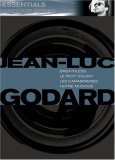| Reviews & Columns |
|
Reviews DVD TV on DVD Blu-ray 4K UHD International DVDs In Theaters Reviews by Studio Video Games Features Collector Series DVDs Easter Egg Database Interviews DVD Talk Radio Feature Articles Columns Anime Talk DVD Savant Horror DVDs The M.O.D. Squad Art House HD Talk Silent DVD
|
DVD Talk Forum |
|
|
| Resources |
|
DVD Price Search Customer Service #'s RCE Info Links |
|
Columns
|
|
|
Essentials Director Series - Jean-Luc Godard (Breathless/Le Petit Soldat/Les Carabiniers/Notre Musique)
THE MOVIES:
"At times you must make your way with a dagger."
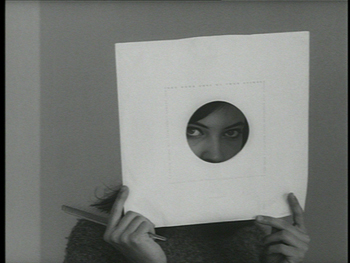
Jean-Luc Godard is often the first name people go to when they want to invoke the spirit of difficult, deliberately challenging cinema. A leader of the French "Nouvelle Vague," bursting out of the French magazine Cahiers du Cinema in the late 1950s, Godard was a cinematic gadfly, employing his vast knowledge and love for movies of the past in such a way as to break them apart and look for something new. Often shooting in a loose manner, capturing what he could guerilla-style on the Parisian streets, he saw film as a mode of expression, one that could uniquely provoke. He set free image, dialogue, and other conventions of motion pictures like a prankster unmooring hot air balloons, gleefully watching the intended balloon riders chasing their escaped aircraft.
His earliest films started by warping genre to his formalistic ideas, opening the door for Godard to begin to inject grander ideas about politics and the state of the world into his deceptively anarchic thrillers. This new boxed set brings together three of his earliest films, each increasingly cantankerous, showing the advancement of an irascible film personality in his first three years of active work. Put in a box as part of Wellspring/Fox Lorber's Essentials series, these three titles--Breathless, Le Petit Soldat (The Little Soldier), and Les Carabiniers (The Riflemen)--have been bundled with 2004's Notre Musique (Our Music)--the director's most recent full-length feature, as well as a shining example of how far out beyond the accepted edge he has taken his filmmaking concepts.
Now, I call this a new boxed set, but "new" should really be in quotes. Make no mistake, the only thing actually new about the set is the fact that it is a set. The 1960s trio are the same exact DVDs the company released in 2001, and then slightly repackaged in 2005, likely as a re-release effort to go with the original release of Notre Musique (though my Le Petit Soldat still bears the 2001 date, the back cover design is different than the copy I owned previously; the new design is full of typos!). There have been no other changes made, they've just been slid inside a thin box with a closing flap that seals with Velcro. Unless you're dying to have the box, or the insert advertising all four titles in the Essentials series that they've slid inside the Breathless case (it was the only movie not individually shrinkwrapped), there is no real reason for you to swap your copies. Retailing for $60, it will technically save you $20 from buying the four films individually, but you will also be stuck with a version of Breathless that is inferior in every way to the more recent Criterion edition.
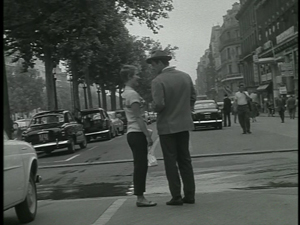
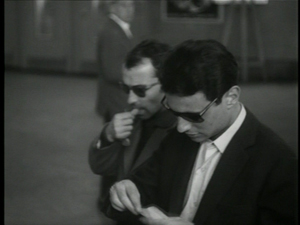
(left to right): Breathless, Le Petit Soldat
* Breathless (90 minutes - 1960): A Bout de Souffle was Jean-Luc Godard's opening explosion in world cinema. Starring Jean-Paul Belmondo as a low-rent hood with delusions of Humphrey Bogart, this freewheeling film gets out of the studio and into the street to capture the rhythm of youth. Belmondo is a jungle animal searching to satisfy his appetites, and he eventually marks a pretty New York girl, Patricia (Jean Seberg), to be his prey. The two share a romance that is equally sensual, contentious, and tender, but as their love blooms, so too does the police dragnet searching for Belmondo tighten.
Breathless is more than a love story, more than a mere gangster movie. It's a struggling for something more, something direct from life. Godard was a precursor to today's pop culture junkies like Quentin Tarantino or Wes Anderson (or even myself, so I am not crafting an insult here) who build their art on the backs of their influences. Breathless was the sum total of his knowledge of Nicholas Ray, Jean-Pierre Melville, and Fritz Lang, and yet this movie is more than emulation. Godard has cast himself as the Sorcerer's Apprentice, playing with the master's wand, but trying to make something that works for his own needs. In this sense, the multiplying brooms are reels of film, and the unstoppable parade ends up coming for the hero of the movie, not his director.
Really, Breathless is a movie about youth, about busting out of the past and finding something in the here and now. The ending itself represents a kind of adolescent romance with existential doom. Live freely, but prepare to pay the price. Likewise, there is a sense of danger in Godard's choice to tear down movie structure and make a picture solely on instinct. As a debut, it is like a line in the sand, a defiant proclamation, one that he would soon start to back up with even more challenging work.
* Le Petit Soldat (88 min. - 1960 production date, 1963 release): Coming right on the heels of Breathless, Michel Subor's Bruno is like Belmondo's Michel if he had actually been able to outrun those bullets. A French deserter living in Switzerland, Bruno has gotten out of one life and is looking to engage in a new one. At the very beginning of Le Petit Soldat, he informs us in voiceover that he's getting too old to be stuck in the action, he needs to get serious about life, the lesson Belmondo should have learned. Currently, Bruno is using his job as a photographer as his cover for his activities as a secret agent on the side of the French nationalists in the war against Algeria. Yet, with all the macho posturing--how many times does someone ask him if he's scared?--it usually appears that Bruno is just playing at being a secret agent, just like Belmondo was playing at being a gangster.
Godard is in scrappy form in Le Petit Soldat. The plot is just as simplistic as Breathless, but that's not the point. Any clenched first can punch you in the face, it's how you swing it. Bruno wants to be a secret agent, but he can't bring himself to kill. He is all mixed up and in love, chasing the beautiful Russian model Veronica Dreyer--likely named for the Danish director but played by Anna Karina, the iconic actress in her first role. Bruno crosses the French, then he gets in trouble with the Algerians, and then he doubts the girl and wonders what it's all for. Most of the movie moves at a fast clip, just like most early Godard, and with the quick cuts and change-ups, you have to be on your toes and stick with it. It only drags some in the middle when the scenes of torture Bruno suffers at the hands of the Algerians goes on a little too long--even despite the narration noting that torture is boring and promising to move through it quickly. Then again, this could also be the director's commentary on the public's laissez-faire views of the issue. (One wonders what Jean-Luc would make of 24.)
It's actually that torture that got the movie banned by French censors for several years, since Godard includes references to the French resorting to the practice, not just the Algerians. In a way, it's fitting that there would be so much contention over Le Petit Soldat, since the auteur appears to have been in a contentious mood when he made it. Not just about the politics of the war, either, but about cinema and possibly his place in the movement he had helped start. Bruno has a monologue where he condemns actors while praising cinema (the famous "Photography is truth. And cinema is truth 24 frames a second" quote). Connections are drawn between Bruno shooting with his camera and shooting (or not shooting) with a gun, including the self-reflexive quoting of the movie's cinematographer, Raoul Coutard, who coined the term "the great hassle." He likely meant it in terms of movie making, that when you try to shoot a film on the street, street life gets in the way; here, it refers to the continued blocking of Bruno carrying out his assigned assassination.
Ultimately, this metaphor leads to Bruno questioning the difference between doing nothing and hollow action. Is it really better to take up arms for a cause if the fundamental precepts of that cause have not been thought through? Is it okay, for instance, to love France for their cinema, but dislike the Arabs because they live in deserts and you can't stand the heat? Is deconstructionist theory enough reason to make a motion picture? Bruno may eventually make his move, but it feels more out of necessity, of being stuck in the flow of things, than it is any settling on a particular conviction. The questions still hang in the air. Yet, the existential futility, the unstoppable events that happen around him, end up giving him that independence he seeks.
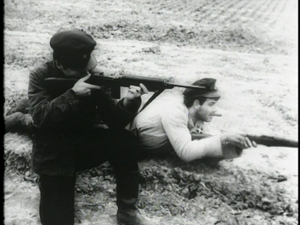
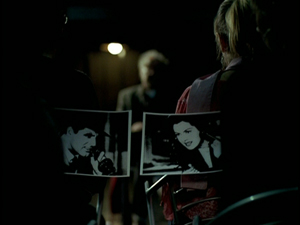
Les Carabiniers, Notre Musique
* Les Carabiniers (80 min. - 1963): Considered by some to be Godard's first failure, Les Carabiniers is a film you have to want to love. Even admiring the technique and the effort to do something more Brechtian in tone isn't really enough for me, I find it a wearying film to watch.
Made as an anti-war movie, Les Carabiniers is the story of an abstracted nation whose King has gone to war with another abstracted nation for reasons that are not for the common man to understand. At the start of the picture, two soldiers (Gerard Poirot and Jean Brassat) go to a shack out in the sticks and recruit the two backwoods brothers who live there. Michelangelo (Albert Juross) and Ulysses (Marino Mase) aren't very smart, and so they agree to join the service, believing the King has asked them personally and promised them whatever pillage they can commandeer. They leave behind their women, Cleopatra (Catherine Ribeiro) and Venus (Genevieve Galea), and head off to fight in places as far-flung as Egypt and Mexico. They send back postcards detailing their exploits in boring detail while we watch them run around shooting people and blowing things up. When they return, the postcards are their only spoils, images of the treasure they think they've earned. Only, the war has turned and their government leaves them hanging out to dry.
While Godard's seemingly improvisational approach works in other agitprop movies like Weekend and the strident politics of a movie like Tout Va Bien can be fascinating, he hadn't quite gotten his craft up to the level of those later efforts when he made Les Carabiniers. Watching one scene after the other of random violence, the feeling that the director is making it up as he goes is a hard one to shake. While this may be akin to the reality of war, it's not fodder for a good movie, not even one that is meant to provoke extreme reactions. Forced exercises in tedium like the family looking over the postcards the boys bring home are just that--forced. There is also an off-putting whiff of intellectual snobbery in the portrayal of these dumb bumpkins who are tricked into committing atrocities. While the underlying message has plenty of relevance, Les Carabiniers tastes like poison when it should be medicine.
* Notre Musique (80 min. - 2004): Forty years later, and Godard still had many of the same concerns. For him, the battlefields had moved, but man still was inhumane to his fellow man, and the director still wondered why the human race can't stay out of war.
Notre Musique is structured in three parts: Hell, Purgatory, and Paradise. The bookends are shorter pieces, leaving the bulk of the running time to Purgatory. Hell is a collage of images of war and violence, both from news footage and motion pictures, suggesting that both the real and the fictional destruction spring from the same impulses. Paradise is a sort of coda, the moving forward of one character into a place of peace, though it be one that is fenced off and guarded by armed soldiers.
Purgatory is essentially Earth, the place where men ponder their fate and the state of the world. Once again, Godard is trying to decide what is more important: theorizing about proper action or action itself. Using the device of a scholarly conference being conducted in Sarajevo, the director places himself in his own movie, creating a pseudo-documentary feel that once again blurs the lines between fact and fiction. The Godard of the movie has actually gone to the conference to discuss the link between text and image, a fundamental question of all his movies. Even so, he doesn't spend as much time on himself as he does exploring the other attendees. It's a gathering of people from many war-torn areas in a place still rebuilding from recent battles. These people pass through a bombed out building, a library of some kind, where the books are now stacked in heaps. They each speak aloud of their feelings of peace, the world, and their culture. But to whom do they speak?
Godard isn't the only person at the conference playing himself, but the crux of Notre Musique rests on the invented character of Olga (Nade Dieu), a young filmmaker who is having a personal crisis that speaks to the central conundrum of the movie. What is the point of philosophy when it can't assuage all the human suffering going on around her? At one point, the question is raised why revolutions can't be noble and humane, to which someone answers, "Because humane people don't start revolutions, they build libraries." Fittingly, when Olga decides to commit her own act of terrorism and threatens to blow up a building, the bomb she carries is a knapsack full of books.
Notre Musique is certainly less anarchic than earlier Godard movies, but its calm demeanor should not be mistaken for intellectual or artistic cowardice. The auteur still stays true to his underlying style, eschewing easy entertainment and instead struggling for something that will inspire and inflame. The decades between the lauded success of Breathless and the also very positive reaction to Notre Musique didn't see Godard resting on his laurels. Rather, he only grew more curmudgeonly, more defiant, and more self-reliant. He could have easily parlayed Breathless into a far more lucrative directorial career the way so many of his contemporaries did after their breakthrough work, but he seemed more interested in taking each new success and tossing it back in his audience's faces. Though I may not have cared for Les Carabiniers, I see within it a man who wants to challenge not only what you think of cinema, but what you think of him. He's not going to give his audience an easy time, and that means he's going to be making it harder on himself, as well. Fellow French director Robert Bresson wrote, "Laugh at a bad reputation. Fear a good one that you could not sustain." Godard earned himself the image of an iconoclast and a provocateur, and he's managed to keep it alive. He has kept his dagger sharp, and he wields it with purpose.
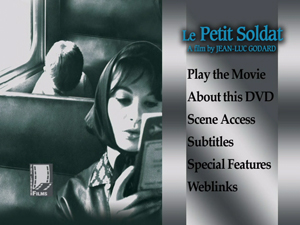
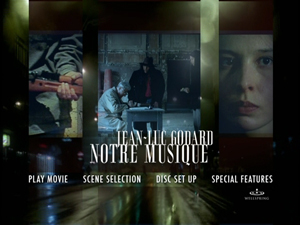
Le Petit Soldat, Notre Musique
THE DVD
Video/Sound:
The three movies from the 1960s are all full frame, all black-and-white. The picture quality can sometimes be very poor, but is usually at least passable and sometimes even good. All of them have a bit of edge enhancement, but thankfully the fuzzy resolution is the only major problem. The surface image is generally clean, with very little by way of dirt, scratches, or jumpy splicing. As I mentioned, though, there is a much better version of Breathless available from Criterion, and its image quality is galaxies beyond what is on offer here. So, all of these could look better.
The basic mono French soundtracks for these films are also decent, preserving Godard's many audio tricks. The English subtitles are removable and yellow.
Notre Musique is the most recent DVD in the package, released right on the heels of the picture's theatrical run. It is also full frame, but it's the only one in color. The picture is of good quality. The multilingual soundtrack is mixed in both 2.0 and 5.1, with English subtitles.
Bonus Features: All four DVDs come in standard DVD cases, and all four have text-based filmographies of the principal players in the movie (usually the two top actors and Godard, but only the latter in Notre Musique).
All three of the earlier films have an audio commentary of some kind by film critic and author David Sterritt. For Le Petit Soldat and Les Carabiniers, these are only on select scenes, which have been spliced together as a special program and thus must be accessed directly through the special features menu. The Breathless commentary runs over the entire movie, and therefore you can choose it at any time with your remote's audio button. On all of them, Sterritt talks about Godard's unique approach to his career and the specific movies, and together they form a kind of mini history of this time in his life. Naturally, the Breathless track is more substantial than the others, getting into far more specifics about shots and story points, but even the short ones have something unique to offer. Of particular note are the issues of government condoned torture that Godard brings up in Le Petit Soldat and which are illuminated in the commentary (recorded in 2000 or 2001). They are eerily familiar to anyone paying attention to the news these days. What's that they say about those who don't know history being doomed to repeat it?
Notre Musique has the trailers for the movie as well as for other Wellspring releases. Though David Sterritt does not provide an audio commentary for it, he did write liner notes for the DVD insert.
FINAL THOUGHTS:
Recommended. Essentials Director Series - Jean-Luc Godard is one of those products that, as a reviewer, I'm torn over how to recommend. The movies are ones I whole-heartedly endorse and think everyone should own--even Les Carabiniers, just because I feel a complete collection of Jean-Luc Godard's 1960s work is essential. As a boxed set of four previously released movies, the price is pretty good, as long as you're aware that there is a much better version of Breathless that you should get all by itself. Buyer beware, essentially. Look at what else is out there, and then decide if this is for you.
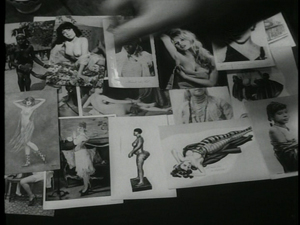
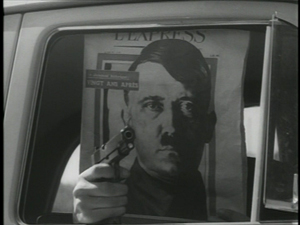
Les Carabiniers, Le Petit Soldat
Jamie S. Rich is a novelist and comic book writer. He is best known for his collaborations with Joelle Jones, including the hardboiled crime comic book You Have Killed Me, the challenging romance 12 Reasons Why I Love Her, and the 2007 prose novel Have You Seen the Horizon Lately?, for which Jones did the cover. All three were published by Oni Press. His most recent projects include the futuristic romance A Boy and a Girl with Natalie Nourigat; Archer Coe and the Thousand Natural Shocks, a loopy crime tale drawn by Dan Christensen; and the horror miniseries Madame Frankenstein, a collaboration with Megan Levens. Follow Rich's blog at Confessions123.com.
|
| Popular Reviews |
| Sponsored Links |
|
|
| Sponsored Links |
|
|
| Release List | Reviews | Shop | Newsletter | Forum | DVD Giveaways | Blu-Ray | Advertise |
|
Copyright 2024 DVDTalk.com All Rights Reserved. Legal Info, Privacy Policy, Terms of Use,
Manage Preferences,
Your Privacy Choices | |||||||









